Digital marketing has rapidly emerged as one of the most promising career paths in the modern job market. With businesses increasingly shifting their focus toward online platforms, the demand for skilled digital marketers is higher than ever. This career offers unique benefits, such as diverse job opportunities, creative freedom, and flexibility, making it an excellent choice for anyone interested in the intersection of technology, strategy, and consumer behavior.
Understanding Digital Marketing as a Career
Digital marketing encompasses a wide range of activities designed to promote products or services using online platforms. This career field is dynamic and constantly evolving, offering a rich landscape for growth and development. To understand why digital marketing is a good career path, it’s essential to delve deeper into its nature, growth prospects, and how it continues to adapt to the digital age.
What Is Digital Marketing?
Digital marketing is the use of digital channels, including search engines, social media, email, and websites, to connect with consumers and promote products or services. Unlike traditional marketing, which relies on physical means like print media or television ads, digital marketing leverages technology to reach a broader audience more efficiently and interactively.
Key areas of digital marketing include:
- Search Engine Optimization (SEO): Optimizing content to improve website visibility on search engines like Google.
- Content Marketing: Creating and sharing valuable content to attract and engage a target audience.
- Social Media Marketing: Using platforms like Instagram, Facebook, and LinkedIn to connect with users and build brand presence.
- Email Marketing: Sending tailored communications to potential and existing customers to drive engagement.
- PPC (Pay-Per-Click) Advertising: Running targeted ads where payment is made only when an ad is clicked.
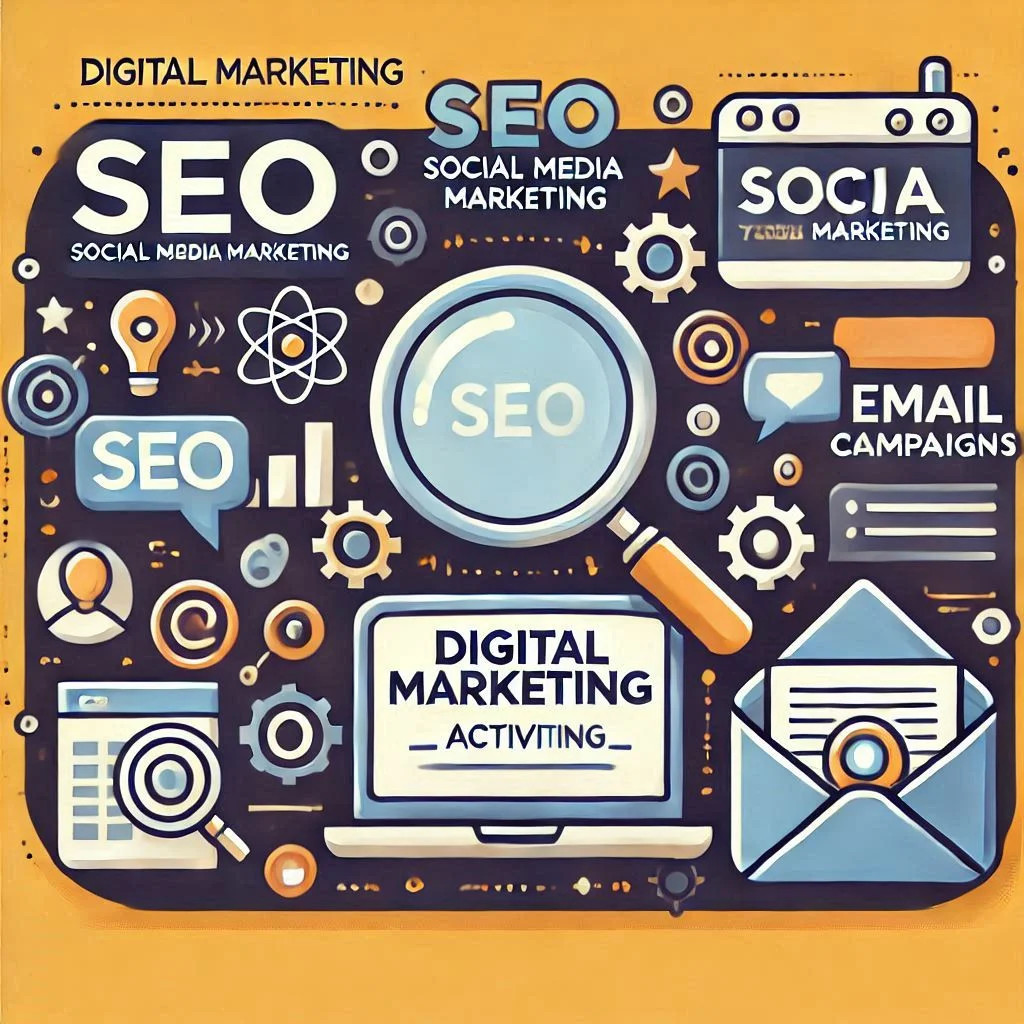
The Digital Marketing Job Role Is Constantly Evolving
One of the most exciting aspects of digital marketing as a career is its ever-changing nature. The industry is heavily influenced by technological advancements, consumer behavior shifts, and new marketing trends. This means that digital marketers must continuously learn and adapt to stay competitive. From incorporating artificial intelligence to using advanced data analytics for personalized marketing, the digital marketing landscape is dynamic and full of opportunities for growth.
Benefits of this evolving nature include:
- Continuous Learning: The need to keep up with trends encourages ongoing education and professional development.
- Innovation: New tools and platforms enable marketers to create unique and effective campaigns.
- Career Growth: Professionals who stay informed and adaptable can advance to higher roles, such as digital marketing strategist, SEO director, or head of digital marketing.

Why Digital Marketing Job Roles Are the Future
The future of job roles in digital marketing looks bright, driven by the growth of online commerce, the increasing importance of data-driven strategies, and the rise of new digital platforms. As businesses shift their focus to online environments, the need for skilled digital marketers is expected to grow exponentially. This career path not only promises high job security but also offers a chance to work in a variety of industries, from e-commerce and tech to healthcare and education.
Key reasons why digital marketing roles are the future:
- Increasing Demand: The ongoing shift from traditional to digital marketing means a surge in demand for digital marketing professionals.
- Diverse Opportunities: Job roles span from SEO specialists to content creators, data analysts, and social media managers, ensuring there’s something for everyone.
- Global Reach: Digital marketing has a global impact, allowing marketers to work with clients and teams across the world.

Benefits of Choosing Digital Marketing as a Career
Digital marketing offers a range of benefits that make it an attractive career choice for individuals looking for growth, creativity, and job security. From its ever-increasing demand and lucrative salaries to opportunities for personal and professional development, choosing a career in digital marketing provides a multitude of advantages. Below, we explore some of the key benefits that make digital marketing an appealing career path.
High Demand for Digital Marketers
The digital landscape continues to expand rapidly, and businesses across industries are prioritizing their online presence. This shift has created a significant demand for digital marketing professionals who can create effective strategies, manage campaigns, and optimize performance. According to industry reports, the global digital marketing industry is expected to grow, which directly correlates with a higher demand for skilled professionals in this field.

Is There a High Demand for Digital Marketing Jobs?
Yes, there is a high demand for digital marketing jobs. Businesses now realize that digital channels are essential for reaching their target audiences, boosting their brand, and driving sales. The COVID-19 pandemic accelerated this transition, solidifying the need for professionals who can effectively use digital tools and platforms.
Lucrative Salaries and Compensation
Digital marketing roles often come with attractive salary packages, especially for those who have specialized skills and relevant experience. While entry-level positions may offer a competitive salary, mid-level and senior roles such as SEO managers, digital marketing strategists, and social media directors can command substantial earnings.
What Is the Average Salary for a Digital Marketer?
The average salary for a digital marketer varies based on factors such as job role, location, and years of experience. According to industry data, entry-level digital marketing specialists can expect to earn between $40,000 and $60,000 per year, while experienced professionals in specialized areas like SEO and PPC management can earn $80,000 to $120,000 or more annually.
Opportunities for Creativity and Innovation
One of the most attractive aspects of a career in digital marketing is the opportunity it provides for creativity and innovation. Whether developing engaging content, crafting compelling email campaigns, or designing social media strategies, digital marketing requires a creative mindset. This freedom allows marketers to experiment with new ideas, create captivating visuals, and try innovative approaches to capture their audience’s attention.
Diverse Career Opportunities
Digital marketing is a broad field that encompasses various specialized roles, allowing professionals to find a career path that matches their skills and interests. Whether you’re inclined toward technical skills, content creation, or strategy, there are plenty of opportunities available.

Key Digital Marketing Roles (e.g., SEO, Content Writing, Social Media Manager)
- SEO Specialist: Focuses on optimizing websites to rank higher in search engine results, increasing organic traffic.
- Content Writer: Creates valuable, engaging, and optimized content to attract and retain an audience.
- Social Media Manager: Manages a brand’s presence on platforms like Facebook, Instagram, and LinkedIn, engaging with audiences and executing campaigns.
- PPC Analyst: Develops and manages pay-per-click advertising campaigns to drive traffic and conversion.
Flexibility and Work-from-Anywhere Potential
Digital marketing offers flexibility and the potential for remote work, making it an ideal career for those who value work-life balance. With the right skills and an internet connection, digital marketers can work from virtually anywhere in the world. This freedom is especially beneficial for individuals seeking a career that accommodates personal commitments or travel aspirations.
Independent Learning and Growth Opportunities
The field of digital marketing is known for its dynamic nature, which encourages continuous learning. There are abundant resources, from online courses and webinars to industry conferences and blogs, that help digital marketers stay current with new trends, tools, and best practices. This emphasis on ongoing education not only boosts professional expertise but also makes marketers more adaptable and valuable in the job market.
How to Get Started With a Digital Marketing Role
Starting a career in digital marketing often begins with obtaining foundational knowledge through online courses, certifications (such as Google Analytics or HubSpot certifications), and hands-on experience. Gaining practical skills through internships or freelance projects can also help aspiring digital marketers build a portfolio and kickstart their career.
Drawbacks of Working in Digital Marketing
While digital marketing is an exciting and rewarding field, it comes with its own set of challenges. Understanding these drawbacks can help individuals weigh their career choices and prepare for the potential difficulties. Below, we delve into some of the key challenges faced by digital marketers.
Challenges in the Industry
The fast-paced nature of digital marketing presents several hurdles that can be demanding for professionals. These challenges often stem from the ever-evolving landscape, tight project timelines, and the high demands of the job. Here are some common drawbacks that digital marketers face:
Constant Change and Adaptability Required
One of the most significant challenges in digital marketing is the constant change in trends, algorithms, and technologies. Digital marketers must be adaptable, always keeping up-to-date with the latest SEO practices, social media algorithms, and emerging tools. This need for continuous learning can be both intellectually stimulating and stressful, as it requires ongoing education and training to stay competitive.

High Computer Usage and Screen Time
Digital marketing is inherently technology-based, which means digital marketers spend long hours in front of their screens. Whether working on campaign analytics, designing creatives, or communicating via emails and chat platforms, the job involves extended screen time. This high level of computer usage can lead to eye strain, repetitive stress injuries, and overall fatigue, impacting the work-life balance and health of professionals.

Meeting Strict Deadlines
Another major drawback of working in digital marketing is the pressure of meeting strict deadlines. Whether it’s launching a new campaign, producing content for a social media post, or handling client requests, digital marketers are often tasked with time-sensitive projects that require quick turnarounds. This can lead to long hours, high stress, and potential burnout, especially during peak periods such as product launches or holiday campaigns.

What Skills and Qualifications Are Needed?
Digital marketing is a multifaceted field that requires a combination of technical skills, creativity, and practical experience. Whether you’re just starting or looking to advance in the industry, understanding the essential skills and qualifications is key to excelling in digital marketing. Below, we outline the critical skills, educational paths, and ways to gain experience in this dynamic career.
Essential Skills for a Digital Marketer
To succeed in digital marketing, professionals must possess a well-rounded skill set that includes both technical and creative abilities. The following are some essential skills every digital marketer should have:
- SEO and Content Marketing Knowledge: Understanding how search engines work and being able to optimize content for visibility is crucial. This includes familiarity with keyword research, on-page SEO, link-building strategies, and creating high-quality content.
- Data Analysis and Analytics: Digital marketers should be adept at using tools like Google Analytics, social media analytics, and other data platforms to track the performance of campaigns, measure KPIs, and make data-driven decisions.
- Social Media Expertise: A strong grasp of how various social media platforms work and knowing how to create engaging content tailored to each is vital for reaching target audiences effectively.
- Paid Advertising: Skills in managing PPC (Pay-Per-Click) campaigns, using tools like Google Ads and Facebook Ads Manager, help maximize ROI and reach specific marketing objectives.
- Creative Thinking and Problem Solving: The ability to come up with innovative strategies, think outside the box, and resolve challenges as they arise can set you apart in a competitive landscape.
- Communication and Collaboration: Effective communication is essential for working within a team, collaborating with clients, or coordinating across departments.

Education and Training for Digital Marketing
While a formal degree can be advantageous, many digital marketers thrive through various educational paths and certifications. Here are some ways to build a solid foundation in digital marketing:
- Formal Education: Pursuing a degree in marketing, communications, business, or a related field can provide a strong theoretical understanding. However, many marketers find success without a degree by focusing on specialized training.
- Digital Marketing Certifications: Various online courses and certifications can bolster your knowledge and add credibility to your resume. Notable options include:
- Google Analytics Certification
- Google Ads Certification
- HubSpot Content Marketing Certification
- Facebook Blueprint Certification
- Workshops and Webinars: Attending workshops, webinars, and industry conferences can offer insights into the latest trends and best practices in digital marketing.
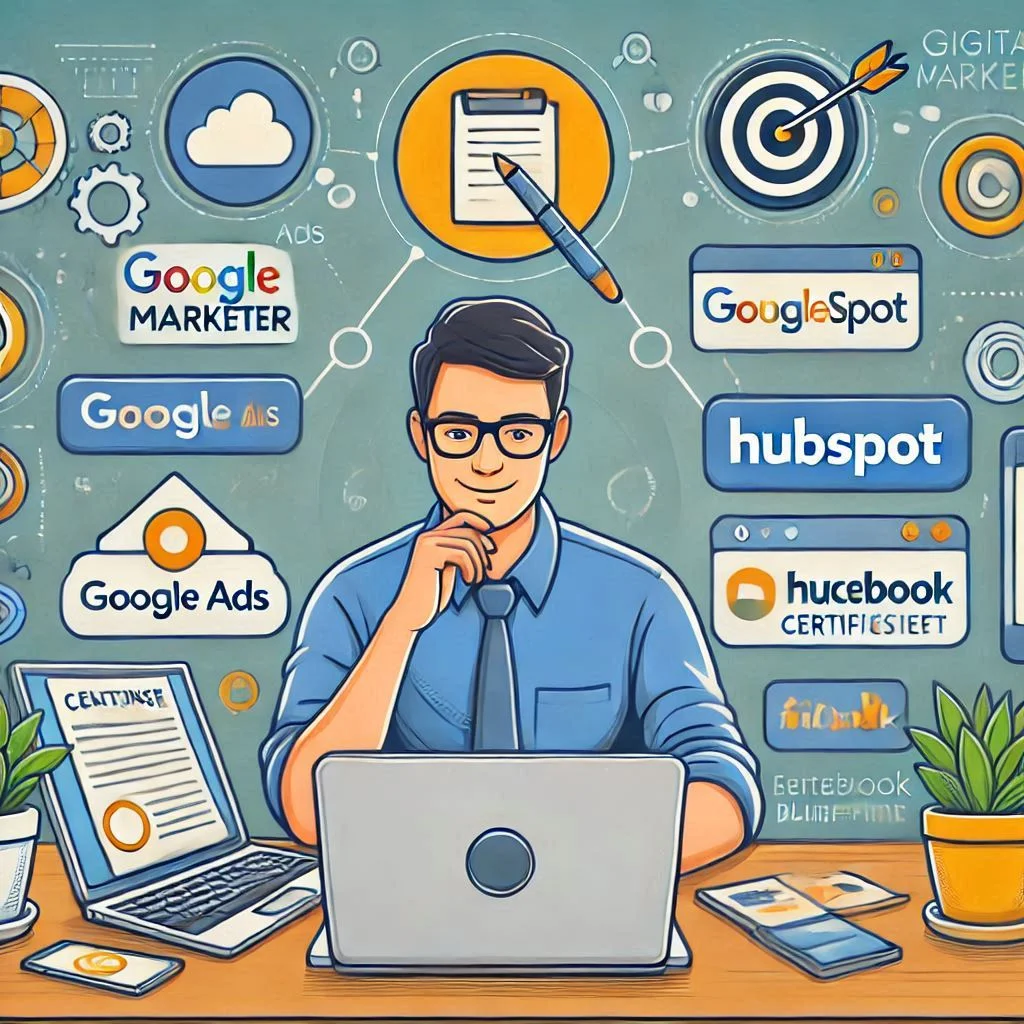
Gaining Experience and Building a Portfolio
Practical experience is essential for a career in digital marketing. Here’s how you can gain hands-on experience and showcase your skills effectively:
- Internships and Apprenticeships: Start with an internship at a marketing agency or a company that offers digital marketing services. This provides exposure to real-world projects and a chance to work under experienced marketers.
- Freelance Projects: Taking on freelance projects or consulting for small businesses can help you build a portfolio and gain client-facing experience. Websites like Upwork, Fiverr, and Freelancer offer opportunities to find freelance gigs.
- Personal Projects and Blogs: Launch your own blog or social media page to experiment with marketing strategies, showcase your creativity, and demonstrate your ability to drive traffic and engagement.
- Collaborative Projects: Collaborating with other professionals on marketing campaigns or working on team projects can give you insight into working within a team setting and understanding diverse perspectives.
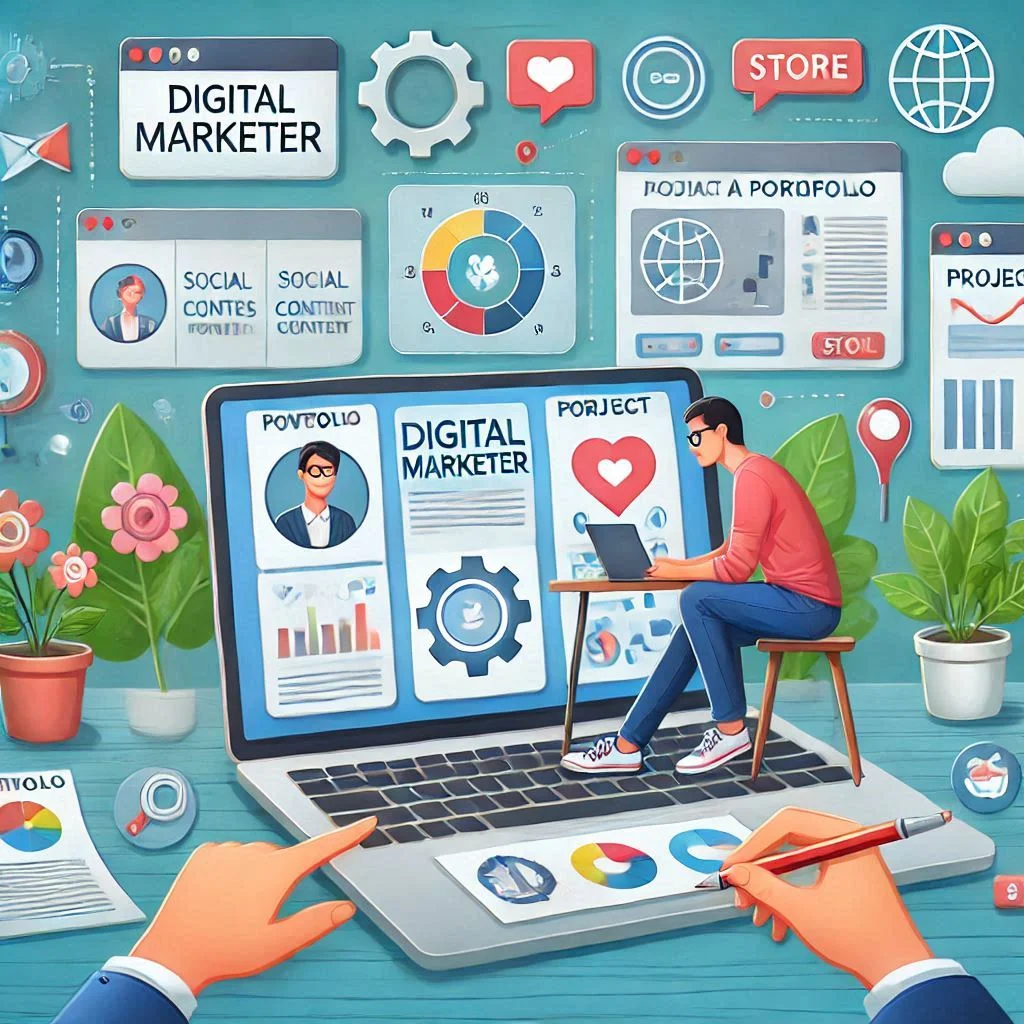
Conclusion: Is Digital Marketing a Good Career Path?
The digital marketing field has experienced significant growth over the past decade, becoming a crucial element of businesses looking to establish their online presence. But is it truly a good career path? Let’s summarize the pros and cons to help you make an informed decision.
Summary of Pros and Cons
Pros of a Career in Digital Marketing:
- High Demand and Job Security: Digital marketing is an ever-evolving field that is increasingly vital for businesses to succeed in the digital era. With the consistent growth of the internet and e-commerce, the demand for skilled digital marketers is projected to remain high, providing job security and numerous opportunities.
- Lucrative Salaries: The salary for digital marketers can be competitive and often exceeds that of traditional marketing roles. Specialists in high-demand areas such as SEO, data analysis, and PPC advertising can command impressive salary packages.
- Creative and Innovative Work: Digital marketing is not just about crunching numbers and analyzing data; it’s also about creativity. Marketers have the opportunity to brainstorm campaigns, create content, and explore innovative strategies that make an impact.
- Diverse Career Opportunities: Whether you want to work in SEO, content marketing, social media management, email marketing, or as a PPC specialist, the digital marketing landscape offers a wide variety of career paths tailored to different interests and strengths.
- Flexibility and Remote Work: Digital marketing roles often come with the flexibility to work from anywhere. This is especially appealing in today’s work environment where remote work is highly valued.
- Continuous Learning and Growth: The field is always changing, which means digital marketers are constantly learning and developing new skills. This dynamic nature of the job can be fulfilling for individuals who thrive on challenges and personal development.

Cons of a Career in Digital Marketing:
- Constant Change and Adaptability Required: One of the biggest challenges in digital marketing is the rapid pace of change. New trends, tools, and algorithms emerge frequently, requiring professionals to constantly update their skills to stay relevant.
- High Screen Time and Computer Use: A digital marketing career involves significant screen time. This can be draining and may lead to health concerns such as eye strain, repetitive stress injuries, and decreased work-life balance if not managed properly.
- Pressure to Meet Deadlines: Many digital marketing campaigns have strict deadlines, especially during product launches or holiday seasons. The pressure to deliver results quickly can be stressful and require strong time management skills.
- Competition and Performance Expectations: The digital marketing field is highly competitive, and meeting performance benchmarks, such as engagement rates, conversion metrics, and ROI, can be demanding.

Is Digital Marketing a Good Career Path?
Overall, a career in digital marketing offers exciting opportunities, lucrative compensation, and the chance to work in a field that continues to evolve and adapt to technology. However, it does come with its share of challenges, including the need for constant learning and the potential for high screen time.
If you value creativity, innovation, and the potential for remote work while being prepared to face the challenges of adapting to rapid industry changes, digital marketing can be an excellent career path. It’s a field that rewards dedication, adaptability, and a passion for technology and communication.
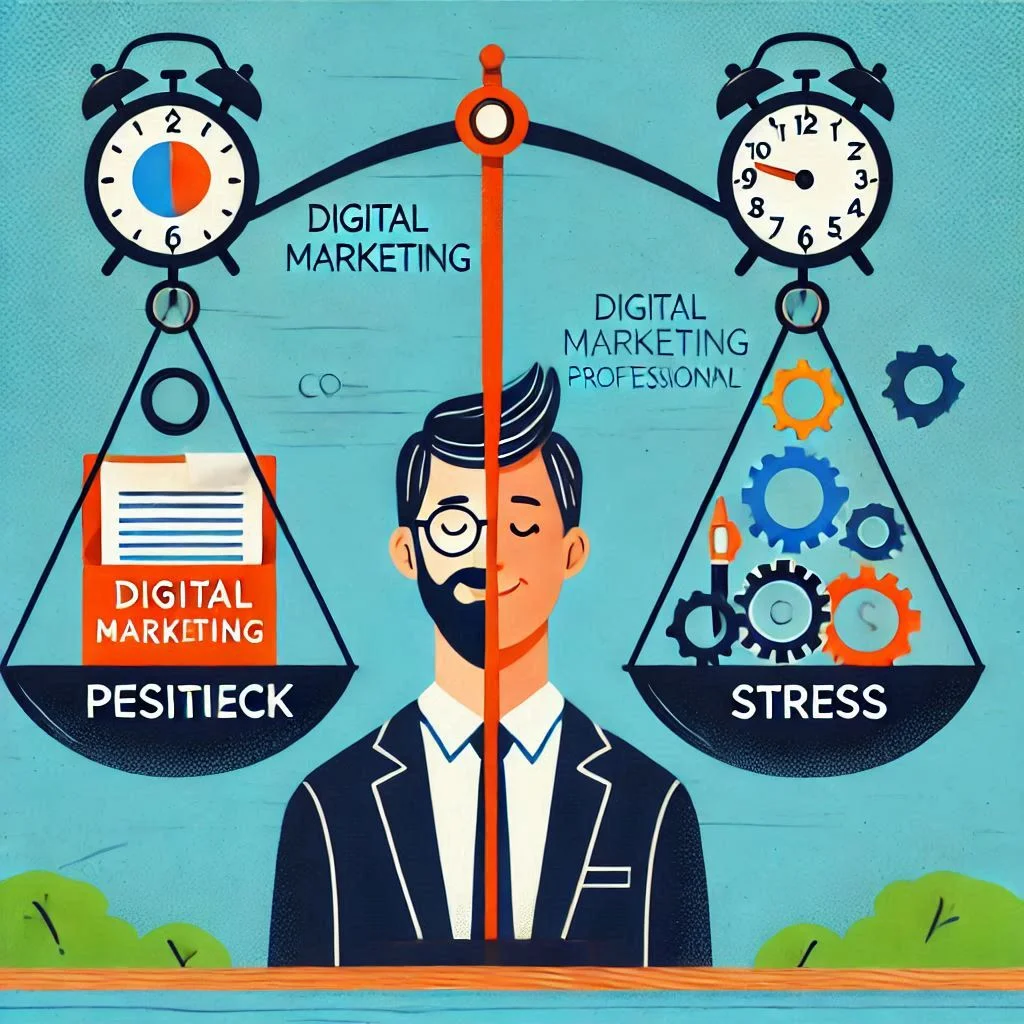
FAQs About a Career in Digital Marketing
Pursuing a career in digital marketing can raise various questions for those just starting out or considering a career change. Here, we answer some of the most frequently asked questions to help you navigate your path in this field.
What Are the Best Ways to Get Started?
Starting a career in digital marketing involves a combination of education, practical experience, and networking. Here are some of the most effective ways to break into the field:
- Gain Relevant Education: Begin by learning the fundamentals of digital marketing. You can pursue formal education like a degree in marketing, communications, or related fields, or opt for specialized courses and certifications that focus on digital marketing skills.
- Online Courses and Tutorials: Platforms such as Coursera, Udemy, LinkedIn Learning, and HubSpot Academy offer courses on SEO, social media marketing, content creation, and other aspects of digital marketing. These courses are affordable and can be taken at your own pace.
- Hands-on Experience: Start working on small projects to build your skills. You can practice by helping local businesses with their online marketing strategies, creating your own blog, or managing social media accounts for friends or nonprofit organizations.
- Internships and Volunteer Work: Gaining practical experience through internships or volunteer work is crucial. This not only helps you learn the ropes of digital marketing but also builds your portfolio and network.
- Networking and Building Connections: Attend industry conferences, webinars, and workshops to meet professionals and gain insights into current trends and job opportunities. Being part of digital marketing communities, whether online or offline, can help you stay updated and find mentors.

What Certifications Are Beneficial for Digital Marketers?
Certifications are an excellent way to boost your credibility and demonstrate your expertise to potential employers. Here are some valuable certifications for aspiring digital marketers:
- Google Analytics Certification: This certification shows that you have a comprehensive understanding of web analytics, which is essential for tracking and interpreting data to make informed marketing decisions.
- Google Ads Certification: Offered by Google Skillshop, this certification validates your expertise in using Google Ads to create successful ad campaigns, helping businesses reach their target audience.
- HubSpot Content Marketing Certification: HubSpot Academy provides this certification to help you master content marketing strategies, from content creation and SEO to inbound marketing techniques.
- Facebook Blueprint Certification: With social media being a significant part of digital marketing, this certification is designed for those who want to specialize in creating and managing Facebook ad campaigns.
- SEO Certifications: Courses from platforms like SEMrush and Moz can provide insights into SEO strategies, which are essential for driving organic traffic to websites.
- Email Marketing Certifications: Gaining certification from platforms such as Mailchimp or HubSpot can demonstrate your ability to create effective email marketing campaigns that drive conversions.
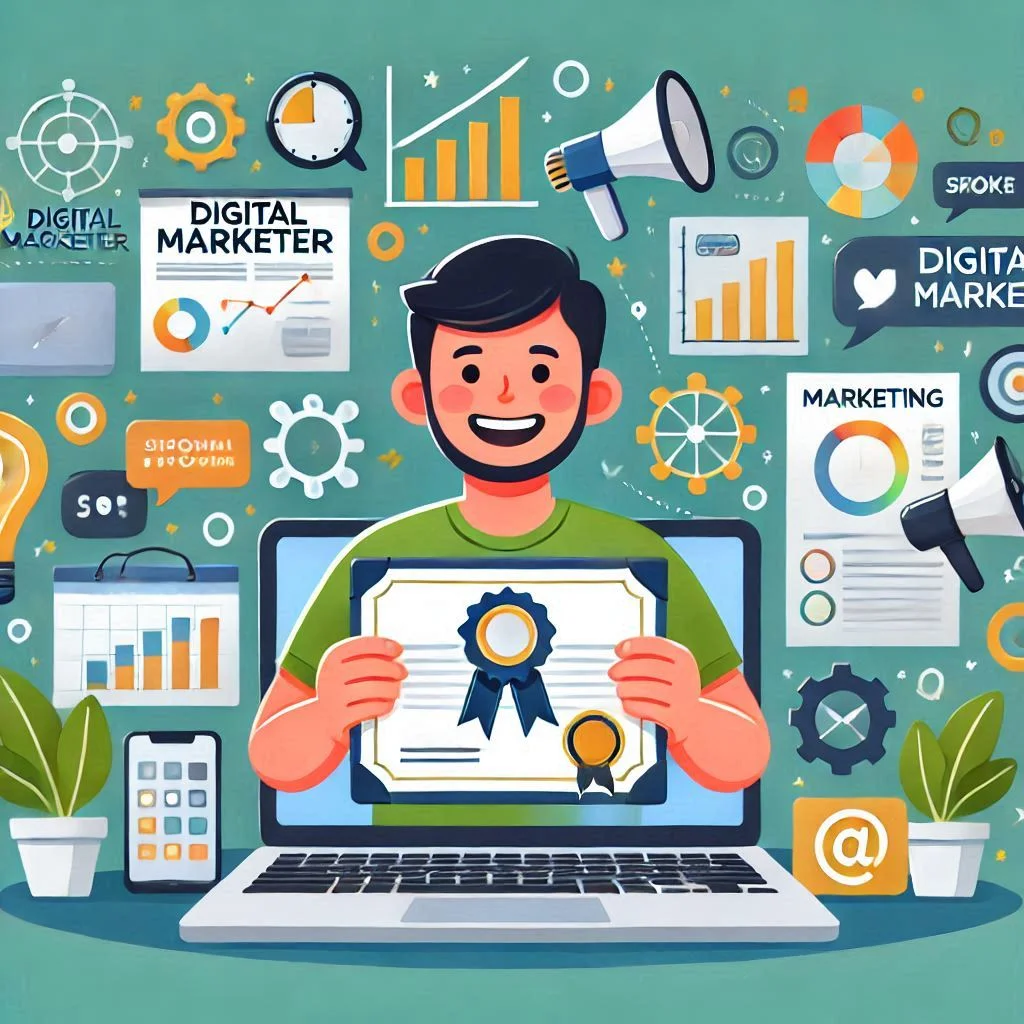
In conclusion, digital marketing presents a dynamic and promising career path for those seeking high demand, competitive salaries, and ample opportunities for creativity and growth. While there are challenges such as the need for adaptability and constant screen time, the benefits far outweigh them. The field’s continuous evolution ensures that digital marketers remain at the forefront of innovation, making it an exciting and fulfilling choice. Whether you’re starting with foundational training or advancing your expertise, a career in digital marketing can lead to long-term success and personal satisfaction. If you’re ready to embark on a career that blends strategic thinking, creativity, and continuous learning, digital marketing is the path for you.

